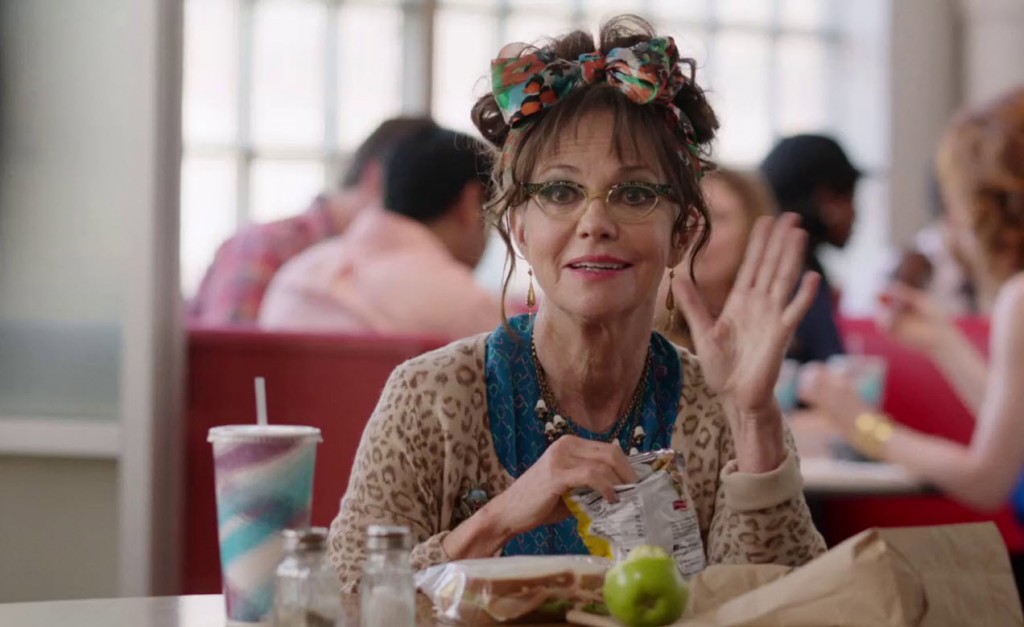SALLY FIELD is an amazing actress.
She has the range and depth of skill to play both comedic and dramatic roles convincingly — as proven by her roles in The Flying Nun and Norma Rae, among many others. Also, she has expressed nothing but love and support for her openly-gay son, Sam, and has publicly called on adults to show more compassion and love to gay youth struggling with their identities, a sentiment I agree with 1000% percent. Let the record show that I, Dar Azimi, am A Fan Of Sally Field. I take my duties as a fan very seriously, which means that when I saw a trailer for a movie last week featuring Field in her first leading role in more than twenty years, I cleared my non-existent schedule, grabbed some herbal refreshment, and made it to the nearest indie theater (gotta support the arts) to catch the next screening of Hello, My Name is Doris.
Bare-bones plot summary: Doris, played by Field, is a sixty-something Staten Island-ite who lives with her aged mother and has worked as a data entry specialist at the same Manhattan design firm for decades. Her mother’s death and a chance encounter with the firm’s charming new creative executive, played by Max Greenfield, shatters the daze that Doris has been walking around in for most of her adult life. What ensues is equal parts hilarity and tragedy.
Field apologist though I am, I will admit I took issue with certain aspects of the movie. The first is that Doris is essentially Jessica Day from New Girl 30 years into the future, the lonely cat lady that we all hope Day will never grow up to be. It doesn’t help that the physical resemblance between Zooey Deschanel, who plays Day, and Sally Field is uncanny, nor that Greenfield also stars in New Girl opposite of Deschanel. Still, this speaks more to my foibles and prejudices than it does to any inherent negative quality of the film. I’m a New Girl hater, what can I do except wear my shame with pride? I also couldn’t help but notice that there are very few actors of color in the film, and none in supporting or leading roles.
The second issue that I had with the film is that I wasn’t sure whether writers Michael Showalter and Laura Terusso were hoping to present Hello, My Name is Doris as a comedy or as a drama. Granted, it can definitely be both; there is such a thing as a a genre called “dramedy,” and great movies, like great actresses, can handle conveying scenes with distinctly different moods. A diner scene between Field and Greenfield is so heartbreaking and poignant that someone predisposed to crying at movies would have a hard time holding back tears, while an earlier scene depicting Field having some much-deserved fun for what could be the first time in years is uplifting in its sheer exuberance. When those moments build organically from each other and the difference in emotional intensity between those moments isn’t completely disparate, they work. And they do. The chemistry between Greenfield and Field is palpable, and it’s one of the main driving forces of the film.
But you can’t drop the emotional equivalent of a nuclear bomb and take the audience’s emotions from a comfortable 4 to a harrowing 9, and then expect to take them back down to a 4 again. Not without them noticing, anyway. There’s a “nuclear bomb” moment in Hello, My Name is Doris, which also serves as the point where the plot begins to resolve itself. Up to that point, the film is more comedy — slapstick, at that — than anything; sure, there are emotional stakes and investment in the characters and a plot that might not end in favor of the protagonist, but the audience spends most of its time up to that point laughing at the antics onscreen. When that moment does come, it’s so jarring that it breaks the suspension of disbelief long enough for the audience to ask: “Wait — is this the same movie I was just watching?” It’s a testament to Field’s skill as an actress that she’s able to harness the emotional intensity of that scene to draw the audience back into the plot.
There’s a lot to love about this movie, though — chiefly, the fact that it reminds us that women over a certain age, though we like to pretend and act otherwise, are not invisible. Field’s character, used to being ignored by all but a few close people in her life (and when she’s addressed by others outside of that small circle, it’s always with a feeling of pity or contempt), finally begins to be seen and noticed. More importantly, she finally begins to see and notice herself. Like Guinevere from Miss Pettigrew Lives for a Day, another woman who’s spent her life being unseen, Doris is ready to live her damn life.
 The awakening that’s catalyzed by her interactions with Greenfield’s character is a sexual one, sure — but it goes much more beyond that. The audience witnesses firsthand how Doris’ life has been spent as a doormat for other people to walk over; it’s heavily implied that she was steamrolled by her self-involved older brother and his callous wife, played to great effect by Stephen Root and Wendi McLendon-Covey, into sacrificing her life’s ambitions to play caretaker to their ailing mother. Likewise, it’s obvious that Doris’ relationship with her loud and boisterous best friend Roz, played by the inimitable Tyne Daly, is one that revolves around them playing certain roles: Roz, the caretaker with all the answers, and Doris, the one who needs to be taken care of. It’s satisfying to see Doris stand up to each of these characters and shuck off the expectations they have of her after she begins to acknowledge and, more importantly, pursue her desires. She doesn’t do it gracefully, but that’s to be expected; Doris-standing-up-for-Doris is obviously a new (but long-overdue) look for the character.
The awakening that’s catalyzed by her interactions with Greenfield’s character is a sexual one, sure — but it goes much more beyond that. The audience witnesses firsthand how Doris’ life has been spent as a doormat for other people to walk over; it’s heavily implied that she was steamrolled by her self-involved older brother and his callous wife, played to great effect by Stephen Root and Wendi McLendon-Covey, into sacrificing her life’s ambitions to play caretaker to their ailing mother. Likewise, it’s obvious that Doris’ relationship with her loud and boisterous best friend Roz, played by the inimitable Tyne Daly, is one that revolves around them playing certain roles: Roz, the caretaker with all the answers, and Doris, the one who needs to be taken care of. It’s satisfying to see Doris stand up to each of these characters and shuck off the expectations they have of her after she begins to acknowledge and, more importantly, pursue her desires. She doesn’t do it gracefully, but that’s to be expected; Doris-standing-up-for-Doris is obviously a new (but long-overdue) look for the character.
It was also great to see how the film depicted the Millennial generation to an audience almost guaranteed to be made up entirely of baby boomers and Gen Xers. While a lot of faces recognizable to and loved by Millennials appear in the movie — Max Greenfield (New Girl), Natasha Lyonne (Orange is the New Black), Beth Behrs (2 Broke Girls), and Kumail Nanjiani (Silicon Valley), to name a few — the film’s draw and marketing angle is without a doubt based on Field. I went for Field; looking around at the patrons in the theater — I was one of the youngest, by the way — I felt confident that they were there for Field, too. Audience demographics aside, I was pleasantly surprised by the treatment the writers gave to Field’s younger co-stars. Granted, the movie does take some obvious digs at hipsters and other members of the Millennial generation; there’s a scene where Doris finds herself at a concert having conversations with multiple denizens of Williamsburg about the kinds of activities they’re into — one straight, cis-female character reveals that the only place she can “be herself” is at a lesbian knitting circle, while another character reveals his “thing” is artisanal tamales. The levels of entitled special-snowflakeness are through the roof, much to the delight of the audience.
It’s these special snowflakes that welcome Doris wholeheartedly into their circle. There’s a scene in the movie where the audience can’t help but wonder if Doris is going to be set up as the butt of these younger people’s joke, if the “old cat lady” is going to be accepted into the fold only to be rebuffed and humiliated. Thankfully, it never happens. They recognize a kindred spirit; they accept and, more importantly, celebrate her in a way that her friends and family — the people who are supposed to be in her corner — don’t. Even her younger coworkers, who at first don’t give her the time of the day because, like everyone else, they too fail to see her, extend genuine friendship and acceptance to her later on in the film when they realize what an interesting person she is. The film highlights one of the better qualities of the Millennial generation, even as it points out some of its more laughable tendencies: its willingness to recognize and celebrate people who are different, people who would be otherwise overlooked by the rest of society.
Hello, My Name is Doris is a movie worth watching, not least of all because it’s one of Field’s best performances in years. It’s an important reminder that desire never completely fades away. We might spend years refusing to recognize it, looking at the smallness of our lives and pretending that this is all we ever expected or wanted out of it, but the gaping hole that sublimated desire creates is still there, waiting to be filled. Until, one day, unexpectedly, something does.

















